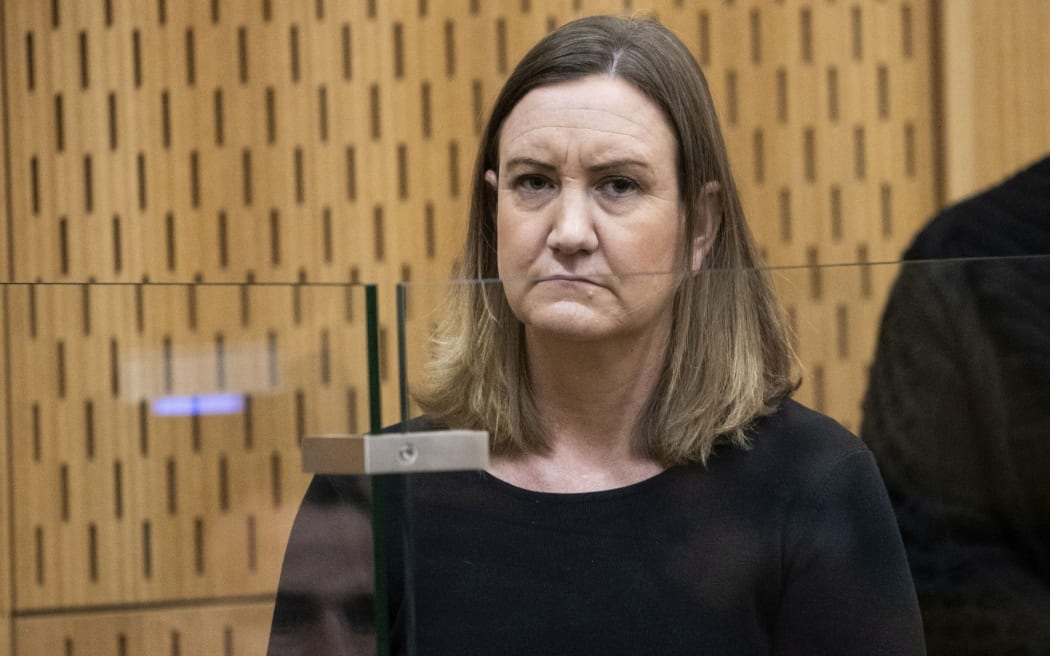
Lauren Dickason, pictured at the beginning of the trial. Photo: Pool / NZME / George Heard
Warning: this story contains distressing content.
An expert forensic clinician has conceded that Lauren Dickason could have been suffering from postpartum depression when she killed her three children.
This is despite his views that the 42-year-old murder accused did not have grounds for an infanticide defence, nor was she insane at the time of the killings.
It was the final admission by the Crown's leading clinical witness following a tense and exhaustive day-long cross-examination by the defence as the murder trial continued at the Christchurch High Court.
Dickason has pleaded not guilty to murdering her daughters Karla, Maya and Liané at their Timaru home on 16 September 2021.
Postpartum depression is defined as a type of depression that happens after having a baby, an issue that Dickason's lawyers are leveraging as part of an insanity and infanticide case.
Forensic psychiatrist Erik Monasterio assessed Dickason after the killings, in a series of four interviews in 2021 and 2022.

Twins Karla and Maya and their older sister Liané. Photo: Supplied
Defence lawyer Anne Toohey asked him about the rapport he had with Dickason during those interviews.
Toohey suggested the pair "did not get on".
"She needs medication and clinical treatment afterwards," Toohey said.
"So that might be a reason, don't you accept, that she might not have told you everything because she's got the impression that you're accusing her of lying in that last meeting in April 2022.
"We saw that in the notes."
He replied that he had no impression that she was not getting on with him.
"These are very traumatic matters and I would not expect the defendant to have been anything other than distressed when I, as a forensic psychiatrist, asked her to discuss specifically what happened at the time of the alleged offences."
Three weeks into the trial, exchanges between Toohey and Monasterio were at times thorny.
The clinician believes there is no evidence of an insanity or infanticide defence.
He admits he "did not know what to make of" elements of the evidence.
Toohey played on this ambivalence, putting it to him that points in his report about Dickason's internet search history were unjustified.
"Your conclusion isn't warranted given that you didn't know what to make of the internet searches."
The jury heard last week about alleged Google searches Dickason entered in the months leading up to the killings, including "lethal dosage" of a particular drug in children, "drugs to overdose kids", "most effective overdose in kids" and "carbon monoxide death".
Another psychiatric expert Susan Hatters-Friedman proposed, in her testimony earlier this week, that Dickason became delusional after arriving in New Zealand in 2021.
Monasterio, however, disagreed with this view.
"She (Dickason) still thought much later than the night that she killed her children, she's continued to think that they were better off dead," Toohey said.
"That in itself indicates that that's a delusion."
"I don't agree," Monasterio replied.
"Delusions are not like bubbles coming out of a bath that they just go into the air and then they disappear ... they occur alongside a whole range of different experiences."
He referred to several clinical judgments at Hillmorton Hospital that did not identify psychosis.
A suggestion Dickason had a reported altruistic motive and killed her children "out of love" was later traversed by the defence.
Unlike discussions with other clinicians, this was a matter the accused did not discuss directly with Monasterio.
"If she has killed her children out of love, doesn't that mean at the time, she didn't appreciate it was morally wrong?" Toohey asked.
Monasterio suggested the notion would require further inquiry.
"The information before me suggests that she did not kill them out of love.
"Love is a confusing concept, different people have different interpretations of it."
The final matter debated was around postpartum depression.
Toohey asked Monasterio whether postpartum depression at the time of the killings could be categorically ruled out.
"Given that you can't be sure that it ever remitted, it's possible that Mrs Dickason's major depressive disorder had a postpartum component on 16 September?"
"It's possible yes," Monasterio replied.
The Crown will provide follow up questions for Monasterio when the trial resumes on Thursday.
Where to get help:
Need to Talk? Free call or text 1737 any time to speak to a trained counsellor, for any reason.
Lifeline: 0800 543 354 or text HELP to 4357
Suicide Crisis Helpline: 0508 828 865 / 0508 TAUTOKO (24/7). This is a service for people who may be thinking about suicide, or those who are concerned about family or friends.
Depression Helpline: 0800 111 757 (24/7) or text 4202
Samaritans: 0800 726 666 (24/7)
Youthline: 0800 376 633 (24/7) or free text 234 (8am-12am), or email talk@youthline.co.nz
What's Up: free counselling for 5 to 19 years old, online chat 11am-10.30pm 7days/week or free phone 0800 WHATSUP / 0800 9428 787 11am-11pm Asian Family Services: 0800 862 342 Monday to Friday 9am to 8pm or text 832 Monday to Friday 9am - 5pm. Languages spoken: Mandarin, Cantonese, Korean, Vietnamese, Thai, Japanese, Hindi, Gujarati, Marathi and English.
Rural Support Trust Helpline: 0800 787 254
Healthline: 0800 611 116
Rainbow Youth: (09) 376 4155
OUTLine: 0800 688 5463 (6pm-9pm)
If it is an emergency and you feel like you or someone else is at risk, call 111.




